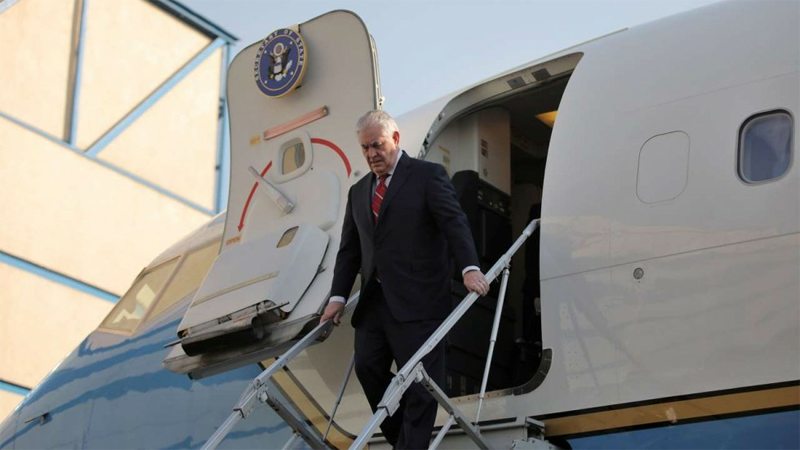US Secretary of State Rex Tillerson’s recent visit to South Asia, which included Afghanistan, Pakistan and India has been proven to be a failed attempt at leaping forward in endeavours for peace and reconciliation in Afghanistan , as the United States continued with its hegemonistic designs to foist its strategies forcefully.
Tillerson’s visit had been hailed and praised as vital for initiating a regional peace process and for Afghan security. However his short sojourn in both Afghanistan and Pakistan, and undermining articulations against the latter, which has been it’s most vital partner in Afghanistan, has disappointed many in Pakistan.
It was Rex Tillerson’s maiden visit to Pakistan as Secretary of State following Trump’s election to the oval office. Thus, many optimists were anticipating that his visit would be a fruitful opportunity to restart bilateral cooperation for peace and reconciliation in Afghanistan. This is because peace and stability in Pakistan is directly linked to peace in the former. But the visit proved to be an utter disappointment as Tillerson once again pointed finger at Pakistan for its alleged inaction against certain terrorist groups. He placed emphasis on Trump’s call for the country to ‘Do More’ in eradicating terrorism which is a problem within its borders, and which ‘can lead to a threat to Pakistan’s own stability.’
Many Pakistani analysts believe that Pakistan genuinely needs a brisk and dependable answer to the Afghanistan issue as it is specifically influencing its security and economy. However it is disappointing that the US government is persistently pointing the finger at Pakistan and making it a scapegoat for its own failures in Afghanistan.
Tillerson’s statements against Pakistan, which is an important stakeholder in the Afghanistan issue, was just a misplaced attempt to please a third party.
 And that is India, which is one of the greatest buyers of US made arms. Yet it can’t be useful in comprehending the issue. Though Tillerson’s visit has set a tone of optimism for growing Indo-US ties and a vision of shared strategic convergence alongside his meetings in India but India needs to be cautious, given some of the contrary and perturbed policy indications that have come from President Trump and his administration in the last few months. Tillerson may want India as a friend but what does Trump want?
And that is India, which is one of the greatest buyers of US made arms. Yet it can’t be useful in comprehending the issue. Though Tillerson’s visit has set a tone of optimism for growing Indo-US ties and a vision of shared strategic convergence alongside his meetings in India but India needs to be cautious, given some of the contrary and perturbed policy indications that have come from President Trump and his administration in the last few months. Tillerson may want India as a friend but what does Trump want?
Even the long awaited strategy on Afghanistan pronounced by Trump carried in it an overt threat to India which stated that India is ‘making billions’ in trade with the US, thus it is required to help the US more. Particularly ‘in the areas of economic assistance and development’, this might mean India has to cooperate or get itself prepared for something else.
A few months earlier it was widely reported that Tillerson belittled Trump as a ‘moron’ and rumours thrived that his resignation was imminent, though these reports were denied by the Secretary of State later on. But New Delhi must keep this in mind while evaluating Tillerson’s exuberant projections of Indo-US ties
However, the current volatility and incoherence in US foreign policy is one of a kind. A few months earlier it was widely reported that Tillerson belittled Trump as a ‘moron’ and rumours thrived that his resignation was imminent, though these reports were denied by the Secretary of State later on. But New Delhi must keep this in mind while evaluating Tillerson’s exuberant projections of Indo-US ties.
However, the visit has by and large proven to be a failure as it failed to bring any diplomatic breakthrough regarding the Afghan issue and what came out as a bi-product was an assertive China. This is because the rise of a more capable and assertive China remains the single most important driver of the growing partnership between Washington and New Delhi.
Although, it would be an utter injustice to call Pakistan’s foreign office dysfunctional yet there are many flaws in Pakistani foreign policy amid foreign policy which need to be addressed. Pakistani foreign policy is based too much on geography thus leading to an exclusion of other variables chiefly economy and a fine display of a ‘soft power’ image. It is an unavoidable truth that Pakistan’s narrative has failed to connect with US policy makers. Thus, understanding the American thought line process must be analyzed, revised and a new narrative needs to be developed.
The writer is currently working as Research Affiliate in an Islamabad based think tank ‘SVI’
Published in Daily Times, November 13th 2017.
